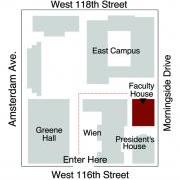Boris Nemtsov, Evgeniya Chirikova and Andranik Migranyan will be speaking on the discussion panel “Russian Elections 2011-12: Is there a Chance for the Political Opposition?’’ The event is set for September 16th at the Faculty House, Columbia University. Institute of Modern Russia and the Harriman Institute (CU) are co-hosting the event.

Many view the upcoming elections in Russia as the most predictable in post-Soviet history. With political freedoms restricted so sharply over the last 10 years, it is no wonder that so few doubts remain as to whether United Russia, the party of power, will prevail in most Russian regions. Since 2003, the political opposition has been harshly pushed away from the political arena: some groups have been denied registration; others have been unable to overcome the 7-percent vote barrier (increased from 5%), which is necessary to enter the Russian parliament, or Duma; and all have been barred from the major TV channels and other state-owned mass media. Still, many of these groups have managed to survive and continue the struggle against Vladimir Putin’s semi-authoritarian regime.
Parliamentary elections have been scheduled for Dec. 4, 2011, and the upcoming results are, on the whole, already clear today. Only one question remains: what percent of the vote will be gained by the six other “permitted” parties?
As for the more-important presidential elections that are planned to be held in March 2012, the question is this: will Mr. Putin come back as the president, or will he try another cunning scheme to preserve his power? At a time when basic political freedoms are under fire in Russia, the question as to whether the political opposition still has a chance to change the situation is more acute than ever before. If such a chance does exist, what is there to be done? Two outstanding representatives of the opposition movements — Boris Nemtsov and Evgeniya Chirikova — will try to answer these questions. With Andranik Migranyan, a well-known Kremlin policy advocate, representing the Kremlin side. Timothy Frye, Director of the Harriman Institute, moderates.
All are welcome to attend this free event. Details are the following:
When: Friday, 16 September 2011, 6:00pm
Where: Faculty House, 4th Fl., Skyline Room
Columbia University
Directions:
Faculty House is located on Columbia University’s East Campus on Morningside Drive, north of 116th Street. Enter campus through gates at 116th and Broadway. Follow College Walk across Amsterdam Avenue towards Morningside Drive. After passing Jerome Greene Hall on the left, enter Wien courtyard through the gates. Follow courtyard around to the right. Faculty House will be the last building on the right.

Boris Nemtsov is a Russian politician and co-chairman of the Democratic opposition movement Solidarnost (Solidarity). From 1991 to 1997 he was Governor of Nizhny Novgorod region, and served as First Prime Minister of Russia from 1997 to 1998. In 1999 he ran for public office as a co-founder of the new Russian liberal political party Union of Right Forces (SPS). He led the party’s parliamentary group in the Russian Duma. In 2008 he joined the opposition movement and became co-chairman of Solidarity. He is an outspoken critic of Vladimir Putin and his regime.
Evgeniya Chirikova is an environmental activist and leader of the movement “Ecological Defense of Moscow Region” and of the unregistered “Movement for the Protection of Khimki Forest.” Since 2007 Ms. Chirikova has worked to focus attention on the government’s plan to build the federal Moscow-St. Petersburg highway through the Khimki district of the Moscow region, in violation of various laws. In March 2011, U.S. Vice President Joe Biden met Evgeniya and presented her with the Woman of Courage Award during his visit to Russia.
Andranik Migranyan is the director of the Institute for Democracy and Cooperation, a non-governmental think tank based in New York dedicated to promoting understanding and cooperation between Russia and the United States. Dr. Migranyan served on the Russian Presidential Advisory Council in the 1990s under Boris Yeltsin. Dr. Migranyan is a professor at the Moscow State Institute of International Relations (MGIMO), and has been published in The New York Times and The National Interest.

